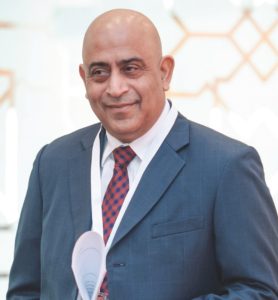Hamid Syed, Vice President and General Manager of UL Middle East, speaks with Fatima de la Cerna of Climate Control Middle East about the new testing facility that the company opened in Abu Dhabi, UAE, as well as the different measures the company is undertaking to not only increase its presence in the Gulf market but also further its relationship with policymakers in the region.

Hamid Syed
UL recently opened, in Abu Dhabi, its first industrial lab in the region. Does this mean the company is anticipating more Gulf-based manufacturers choosing to get their products tested and certified?
Absolutely, mainly because if you look at the Abu Dhabi Vision 2030, the UAE Vision 2021, the Saudi Vision 2030 and the other vision statements in the region, sustainability and renewables are major components, and the HVACR industry plays a big role in pushing for those.
There are already a lot of regulations in place. In Saudi Arabia, for example, there are policies on energy conservation that some have described as being draconian but are actually necessary. And those policies directly affect the HVACR industry, which in turn, strongly contributes to the different visions. And in order to maintain public confidence in the region’s programmes, in its efficiency and energy ratings, third-party testing is absolutely necessary – something that I’m sure the industry recognises.
Speaking of policies and programmes, could you give us an update on UL’s working relationship with government agencies like SASO (Saudi Standards, Metrology and Quality Organization)?
In UL, our parent company has an arm that does standards writing as well as an arm that does R&D. There is definitely collaboration between the two teams. And UL’s people don’t write standards on their own – they work with the industry and with governments, and take into account variations in environmental conditions. For example, temperatures in the United States rarely go up to 50 degrees C, but in some countries, temperatures tend to get really high. And so while they do adopt specific international standards, they want to ensure that the standards include a deviation that ensures products can operate safely in elevated temperatures. In cooler countries, governments, of course, want to make sure that products can be safely operated in lower temperatures.
In the past, we at UL were only looking at electricity, at ensuring safe living and working [spaces]. But things have changed
So, UL collaborates with governments in writing those standards, and when we do R&D work and find something significant, we share it with the public. UL supports strong public-private partnerships (PPPs), which we’ve been involved in for over 100 years. This type of partnership allows us to exchange data.
We are not so arrogant to think that we know everything, so we try to learn as much as we can from the countries we’re operating in. We’re learning from the UAE, from Saudi Arabia. We have signed an agreement with SASO as well as with JSMO (Jordan Standards and Metrology Organization). In Kuwait, we have an accreditation with the Ministry of Electricity and Water. Those partnerships are strong and significant, but there are still opportunities for expansion. We’re a small team in the Middle East – that’s one of the challenges we face. We would love to expand and build stronger relationships, moving forward in countries like Qatar and Oman.
Other than opening a new lab in Abu Dhabi, what initiatives and measures is UL undertaking to strengthen its presence in the region?
In the past, we at UL were only looking at electricity, at ensuring safe living and working [spaces]. But things have changed. It’s no longer just about fires and [electric] shocks. Everybody is now looking at sustainability and the environment. We now have indoor air quality, and people thinking about the paint they’re using, about VOCs.
We have a market surveillance team, which goes out and buys products with UL money
Those are priorities for us right now – indoor air quality, sustainability and environmental health. Renewables are also a big focus for us. In fact, we have just acquired a company called AWS Truepower. There are also innovations like 3D printing, which would greatly benefit the construction and medical sectors. So in a nutshell, those – plus cyber security – are what’s shaping the strategies that are moving us forward right now.
Back in June, Climate Control Middle East published a story about the misuse of third-party certification marks. How big a problem would you say it is, from a UL perspective?
With everything we do here and everything the government does, the common ground is that we want to create a safe living and working environment for people. And there’s an economic aspect to that, as well, because a safe region encourages investor confidence.
What UL does is we collaborate with enforcement agencies like the Dubai Police, Interpol and Europol. We work with them to find ways to combat counterfeiting. One time, I was sharing this with someone, and the person asked, “Does that mean it is a problem?” No, it means that prevention is better than cure.
It’s just one of those things, you know? People will find unique ways to get in…. But the government and UL feel very strongly about it. We had one case wherein our customer actually forged a certificate that we had issued. Needless to say, we blacklisted that customer and informed the authorities.
We have a market surveillance team, which goes out and buys products with UL money. Those products are then brought back to our labs and tested. So, we take this very seriously and the main reason is because everything that we do, all that will be wasted if a low-quality, non-performing product gets into the market with a counterfeit [UL] label.
[The writer is the Assistant Editor of Climate Control Middle East.]
Copyright © 2006-2025 - CPI Industry. All rights reserved.